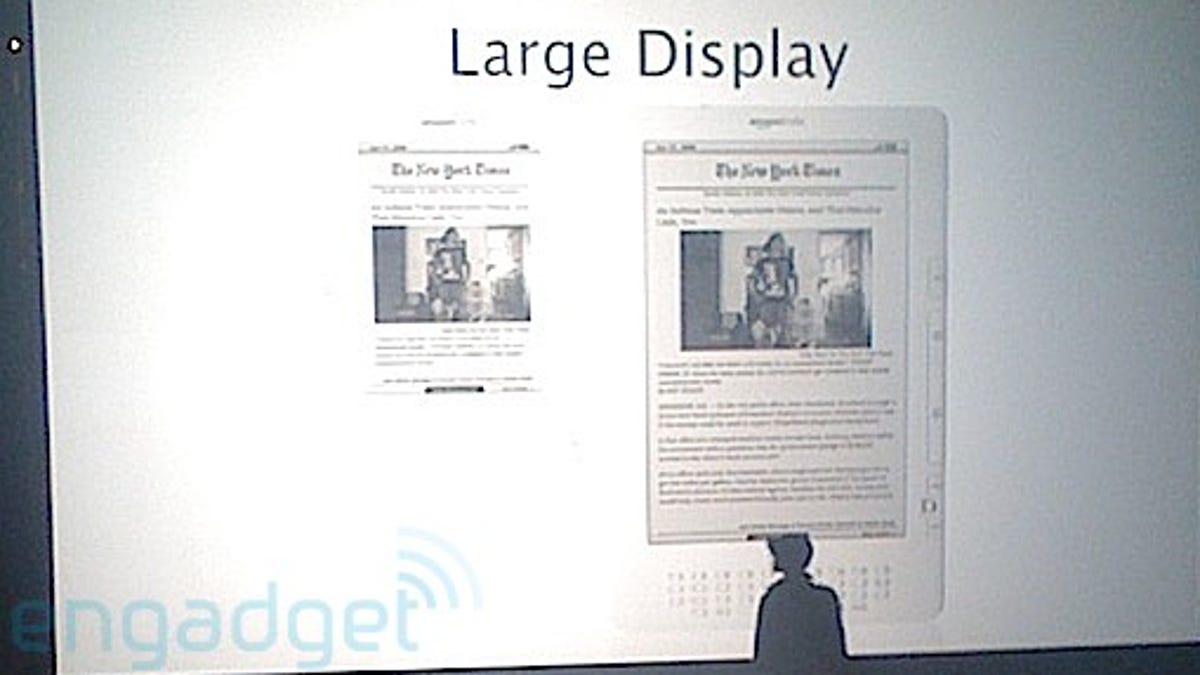Is Kindle a newspaper savior? Not quite
The company is expected to unveil a larger-screen Kindle e-reader on Wednesday, and the target audience appears to be textbook publishers and universities.

Newspapers hoping the next version of Amazon.com's Kindle e-reader will be a savior for their beleaguered businesses are likely to be disappointed when it's unveiled Wednesday. But this Kindle could win plenty of converts in academia.
Amazon is slated to unveil a new, larger-screen version of the Kindle, which it originally launched late in 2007. Possibly called the Kindle DX, the new device is designed for reading newspapers, magazines, and textbooks, and it's expected to be part of new electronic course material test-runs at six universities this fall. The list, according to The Wall Street Journal, consists of Pace University (where Amazon is holding Wednesday's press conference), Case Western Reserve, Reed College, Arizona State University, the Darden School at the University of Virginia, and Princeton University--Amazon founder Jeff Bezos' alma mater, which already publishes Kindle textbooks.
This move makes loads of sense. Anyone who's been to a U.S. college in the past few decades could tell you that textbooks are very highly--some would say obscenely--priced. They're also bulky, and often difficult to get rid of once purchased: Selling the third edition of an introductory biology textbook on the used-book market is pretty difficult when the fourth edition comes out a year later. Theoretically, this should be the perfect market for an electronic reader like the Kindle.
But just because Amazon has inked a few deals with textbook companies, and a handful of prominent academic institutions, doesn't mean that hordes of incoming freshmen across the U.S. will be moving into dorms this fall with Kindles in hand.
"I do think the textbook market will be the killer app for e-readers," said Sarah Epps, a media analyst at Forrester Research. "(But) we think it's going to start to develop in 2011 and really pick up in 2013...We've been talking to publishers, talking to universities, and what we're seeing is that from the publisher perspective there's some hesitation."
Why's this? There are a lot of questions for the publishing industry, the biggest of which is whether electronic textbooks will take a bite out of the profits that manufacturers are making from paper textbooks. There's also the potential issue of licensed content in textbooks that might not have digital rights stipulated in its original agreement with the publishers. Then, as Epps pointed out, there's the Google problem.
For the past few years, Google has been pushing forward a book scanning and digitization project called Google Book Search, and though it has some prominent allies in the industry, to say that Google Book Search has been controversial would be putting it lightly. The Association of American Publishers sued the search giant in 2005 over potential copyright violations. Authors and publishers of out-of-print books have petitioned for royalties from digitized books. More recently, library industry trade groups have expressed concern in the form of a legal filing over what Google's efforts could mean for their business. An agreement in court has been delayed.
For Amazon, this could mean that it'll have to deal with some publishers who have become quite suspicious of large-scale digital book projects. But on the flip side, this could work to the Seattle-based retailer's advantage: if the digital shift is as inevitable as it appears, and Google is to be the Silicon Valley villain in this story, then Amazon, which has been in the book business for nearly two decades, could be the friendlier alternative.
There's also the potential for the new Kindle, whatever it's called, to have a significant impact outside the U.S. Forrester analyst Epps speculates that it will make waves in developing markets like China and India, where there are millions of university students with tight textbook budgets. "Using e-readers for textbooks would be incredibly empowering for students in their universities," Epps said, "but that's going to take some time."
It's clear that Amazon could shake up the twin pillars of educational publishing and academia with its new Kindle, potentially a much bigger splash than the launch of the original Kindle or its improved Kindle 2 successor earlier this year. What's less clear is how immediate the change will be. And what's even less clear is what impact the new, bigger Kindle will have on the market that everyone was expecting Amazon would target: print periodicals.
Rumor has it that The New York Times will be part of Wednesday's Kindle announcement, possibly lowering its price for a Kindle subscription. But this doesn't mean that Amazon's skinny gadget will suddenly save print media: Newspaper and magazine publishers may think they still get the short end of the stick.
"The way things work now, newspapers and magazines can distribute their content over the Kindle if they want, but it's not a very good model for them. Amazon is keeping the majority of the revenue," Epps said. "In addition, there are some business problems, like that publishers can't count subscribers toward their rate base, so it's diluting rather than adding to their subscription base from the perspective of the business."
But while Amazon has the textbook market in focus, it shouldn't let newspapers and magazines get away from it: this is somewhere that the manufacturer of a rival e-reader could sneak in.
"Some of the other device competitors that will be coming to the market over the next year may be more appealing partners for newspaper publishers," Epps said. "It's another distribution channel for their content, but not all distribution channels are created equal. So there could be a great opportunity for publishers to distribute their content on other types of e-readers, where they have a more favorable business model."

